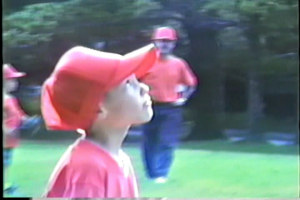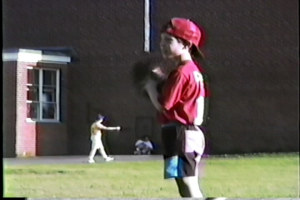It's Tee-Ball Season Again

My Drew dreaming in the tee-ball outfield.
A friend recommended that I read NurtureShock: New Thinking About Children
She knows that my own sons are grown now, but she said that I would agree with the basic premise that many of our popular strategies for raising children are bad strategies.
Maybe she was getting me ready for some future grandchildren. And she was probably thinking about the implications for teachers and school programs.
The first "problem" I noted in a browse of the book is about the inverse power of praise. We give too much praise and let effort count more than actual results.
I wrote about that last summer here in a piece called "School As T-Ball." I was thinking that the effort-rewarding philosophy of tee-ball was working its way into schools.
It might seem to be a good philosophy for very young children. We want to foster the idea of trying. We encourage "low stakes testing" where failure is okay. I see a place for tee-ball on a field even in some classrooms. My sons both played tee-ball.

My Justin considers life after tee-ball.
If we are playing in a game where everyone gets up to bat, no one gets out and both teams win, I don't know what the point of playing is after awhile.
And, yes, I know that even older ballplayers will hit off a tee. It can be a good "scaffolding" activity and a way to teach good habits. But that tee is taken away when the game begins.
That's just one part of the book. It also takes on topics like why insufficient sleep adversely affects kids' capacity to learn; why white parents don't talk about race; why kids lie; why evaluation methods for giftedness and the accompanying programs don't work; and why siblings really fight.
Reviewers seem to have been fairly kind to the book. But there were those who disagreed - like the New York Times Book Review that felt that every generation seems to have a "revolutionary" book of parental advice (see Dr. Spock
I am giving it a read and I find myself agreeing more than disagreeing.
But I also know that I am still very likely to cheer on my grandchildren if they play tee-ball, no matter what the book says.
http://www.pobronson.com
Comments
No comments